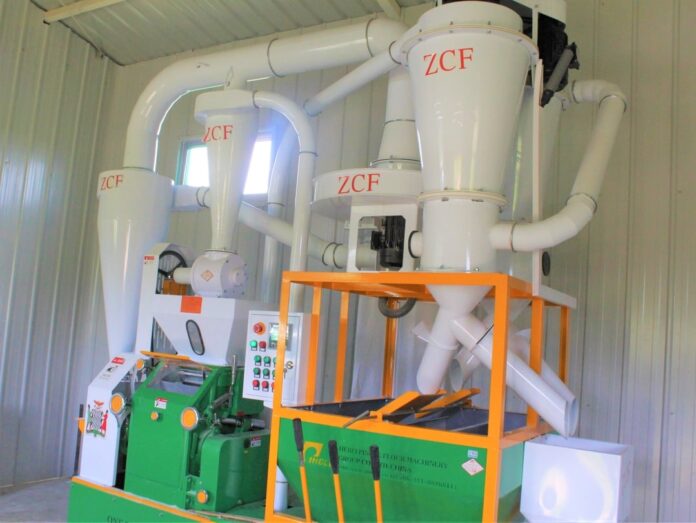By Christopher Bazilio Banda – Chipata (Eastern Province)
Nearly half of the 307 Zambia Cooperative Federation (ZCF) solar-powered milling plants in Eastern Province have stopped working, several have been abandoned by cooperatives and 30% have had solar panels stolen, MakanDay has established.
The project financed with a US$ 200 million loan from China unveiled in 2015, touted by ZCF as rural industrialisation, was given to farmer cooperatives across the country and was also used to promote then-President Edgar Lungu.

An earlier investigation by MakanDay, published in partnership with ZAM-net Foundation, revealed that the plants were already facing challenges, ranging from non-availability of spare parts to dysfunctional central control systems.
The cry from farmers
Concerns about the massive loan and its much-feared payback arrangements has been a thorny issue since the start of the project, but ZCF pressed ahead, forcefully arguing its cooperatives into agreements and supplying the plants.
Kepson Lungu, chairperson of Kasongo Cooperative in Chipata said his group was incorporated into the project when ZCF installed a milling plant at Kapachi.
“As at now I can say farmers are not benefiting anything because ever since they were installed, they have never worked to the expectations of the people,” he said.
“You know those solar hammermills came without batteries, so the problem which is there is that, when any person goes there to grind, it takes hours for it to finish one bag, so in a day it can only manage maybe three or five bags because solar power is not enough for it to work effectively,” he added.
A pure case of a novelty going bad
Although this was at first thought to be a good idea in the country where electricity is still not widely or continuously available, it has turned out to be a burden. At night and on cloudy days, and in the absence of power storage devices such as batteries, the milling plants do not function.
ZCF is blaming farmers and vandals for the project’s failures. Provincial Coordinator, Suzgo Zomba admitted that some of the mills are not working but placed the blame on cooperative management’s failure to keep them running.
“Other than those that have got faults; most of these solar hammer mills are operational, what I mean operational, is that they’re in a working condition, where you can switch it on and it will run.,” he said.
ZCF says 620 solar panels have been stolen at 60 mills in the province. Zomba claims, in Lundazi district, cooperatives have kept 53 mills running out of 56, a perfect example of the success of the project.
.jpeg)
More problems for farmers
Thefts are attributed to cooperatives’ failure to raise enough funds to maintain staff who can provide security. In fact, all the surveyed plants in Chadiza and Chipata have laid off the workers due to failure to pay salaries.
In many cases, the salaries which cooperatives are failing to pay are as low as K400 (US$ 24) per month, way below the minimum wage for domestic workers. Zambia’s minimum wage is determined by category of employment and for domestic workers, it is K840 (US$ 50) per month.
Cooperatives blame it on the mills’ failure to generate enough money to pay the workers and a loan to China through ZCF in a monthly instalment of 1,700 Kwacha (US$ 100) over a fifteen-year period.
The average monthly income for the cooperatives, with on average two workers, a miller and a security guard, is eight hundred Kwacha (US$ 47).
It takes 38 minutes to grind a 50Kg bag of maize
Another problem has turned out to be the fact that some cooperatives are threatening to pull out of the project. Lungu at Kasongo Cooperative said continuing with the project will be very difficult because nothing positive is happening with these hammer mills.
“There is no way a person can spend the whole day to mill only 2 bags, why should we continue with something which does not work effectively?” He asked.
A check at the ZCF provincial office milling plant revealed that the solar milling plant is much slower compared to the electric-powered mill. For example, to grind a 50 kg bag of maize took about 38 minutes in full sunlight, almost three times more than what it takes the electric-powered one.

Discover more from MAKANDAY
Subscribe to get the latest posts sent to your email.



